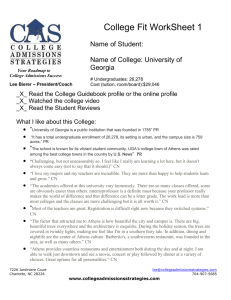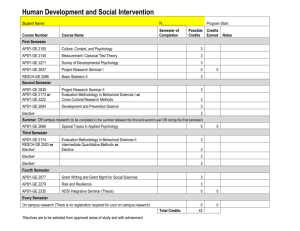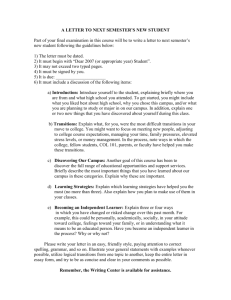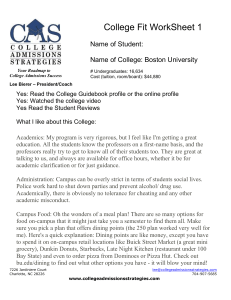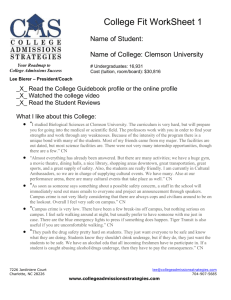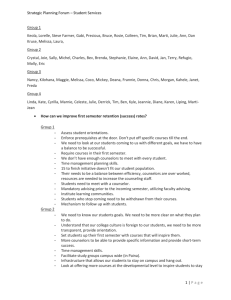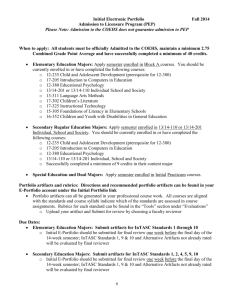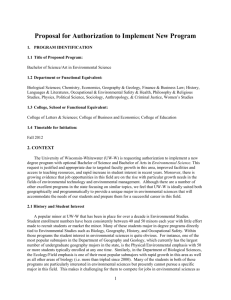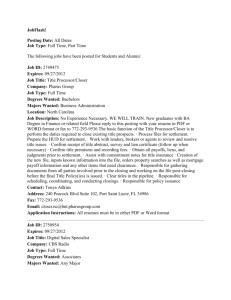Characteristics You Should Consider
advertisement
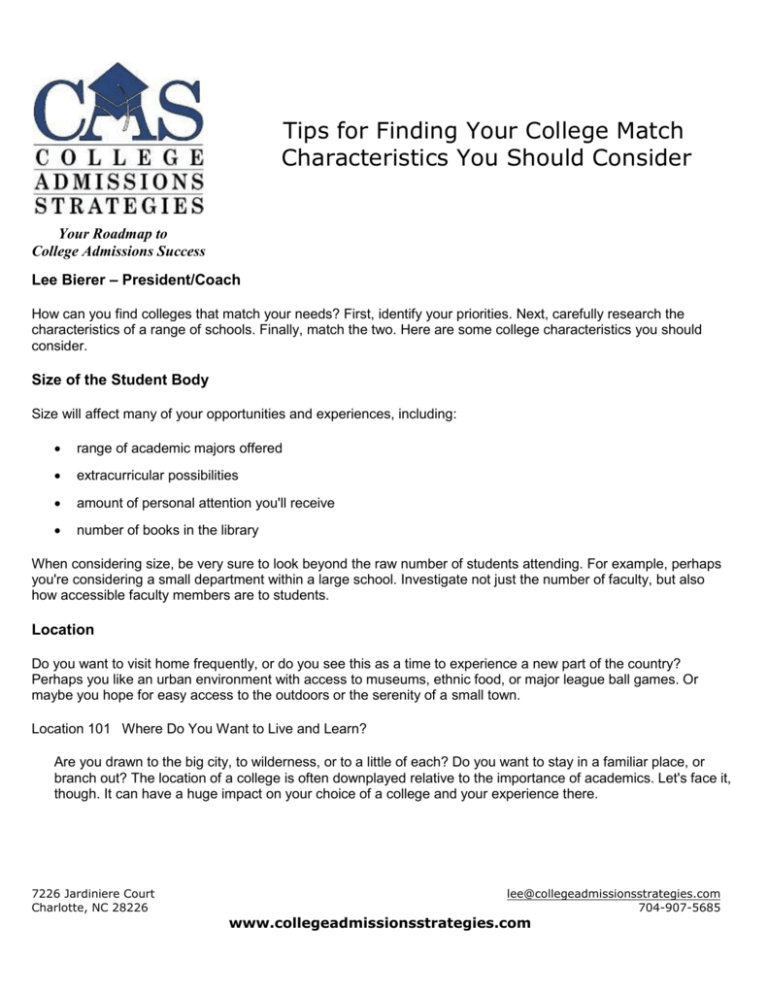
Tips for Finding Your College Match Characteristics You Should Consider Your Roadmap to College Admissions Success Lee Bierer – President/Coach How can you find colleges that match your needs? First, identify your priorities. Next, carefully research the characteristics of a range of schools. Finally, match the two. Here are some college characteristics you should consider. Size of the Student Body Size will affect many of your opportunities and experiences, including: range of academic majors offered extracurricular possibilities amount of personal attention you'll receive number of books in the library When considering size, be very sure to look beyond the raw number of students attending. For example, perhaps you're considering a small department within a large school. Investigate not just the number of faculty, but also how accessible faculty members are to students. Location Do you want to visit home frequently, or do you see this as a time to experience a new part of the country? Perhaps you like an urban environment with access to museums, ethnic food, or major league ball games. Or maybe you hope for easy access to the outdoors or the serenity of a small town. Location 101 Where Do You Want to Live and Learn? Are you drawn to the big city, to wilderness, or to a little of each? Do you want to stay in a familiar place, or branch out? The location of a college is often downplayed relative to the importance of academics. Let's face it, though. It can have a huge impact on your choice of a college and your experience there. 7226 Jardiniere Court Charlotte, NC 28226 lee@collegeadmissionsstrategies.com 704-907-5685 www.collegeadmissionsstrategies.com The Familiar vs. the Unknown - Consider how you react to new situations and people. If you get anxious or homesick for familiar diversions, you may not want to throw yourself into a different environment. On the other hand, college is all about new experiences, whether you seek them or not. A change in locale can be one. For example, maybe you live in a large city but want to try life in a small town. Managing Expectations - Learn what to expect from a college's setting before you go and, better yet, before you make your final decision. For example, if you live in an urban area and go to school in a rural area of Montana, don't be shocked when you can't get anything you want, whenever you want it. You've Got Options - If you get to campus and don't feel anchored to the school or its location, you're not stuck. Many schools offer an option to study abroad or off-campus for a semester or a year. You can also transfer to another college or program. Keep in mind, too, that a college's location is only one characteristic, however significant. Factor in other things such as the kind of school, majors offered, financial aid available, and most importantly, the feel of the college. Bottom Line - Ultimately, you determine what experience you'll have at college. You need to evaluate who you are, places you like, the activities you enjoy, and how easily you adapt to new situations. Academic Programs If you know what you want to study, research reputations of academic departments by talking to people in the fields that interest you. If you're undecided, relax and pick an academically balanced institution that offers a range of majors and programs. Most colleges offer counseling to help you find a focus. Here's a sampling of special program offerings: Accelerated Program: Want to earn your bachelor's degree in three years, rather than four? This is a program you complete in less time than is normally required, usually by attending summer classes or by carrying extra courses. Cooperative Education: Sometimes called work study, this program allows you to alternate between semesters of full-time study and related paid full-time work. It takes five years to receive a bachelor's degree under this plan, but you get a year's practical experience, too. Double Major: Complete the requirements of two majors, concurrently. Honors Program: This is an opportunity for educational enrichment, independent study, acceleration, or some combination of these. Independent Study: Complete some of your college program by studying independently, instead of attending scheduled classes and completing group assignments. Internships: This is any short-term supervised work experience, usually related to your major, that earns you academic credit. Student-Designed Major: Construct a major field of study not formally offered by the college. Often nontraditional and interdisciplinary in nature, the major is developed with the approval of a designated college officer or committee. 7226 Jardiniere Court Charlotte, NC 28226 lee@collegeadmissionsstrategies.com 704-907-5685 www.collegeadmissionsstrategies.com Study Abroad: Complete part of the college program studying in another country. A college may operate a campus aboard or it may have a cooperative agreement with some other American college or an institution of the other country. Urban Semester: Spend a semester in a major city, such as Philadelphia, Chicago, New York, Denver, or San Francisco, experiencing the complexities of an urban center through course work, seminars, and/or internships related to your major. Visiting/exchange student: Study for a semester or more at another college without extending the amount of time required for a degree. Washington semester: Participate in an internship program with a government agency or department in Washington, D.C. Campus Life Consider what your college life will be like beyond the classroom. Aim for a balance between academics, activities, and social life. Before choosing a college, learn the answers to these questions: What extracurricular activities, athletics, and special interest groups are available? Does the community around the college offer interesting outlets for students? Are students welcomed by the community? Is there an ethnic or religious group in which to take part? How do fraternities and sororities influence campus life? Is housing guaranteed? How are dorms assigned? Cost Today's college price tag makes cost an important consideration for most students. At the same time, virtually all colleges work to ensure that academically qualified students from every economic circumstance can find financial aid that allows them to attend. In considering cost, look beyond the price tag. Diversity Explore what you might gain from a diverse student body. Think about the geographic, ethnic, racial, and religious diversity of the students as a means of learning more about the world. Investigate what kinds of student organizations or other groups with ethnic or religious foundations are active and visible on campus. Retention and Graduation Rates One of the best ways to measure a school's quality and the satisfaction of its students is to learn the percent of students who return after the first year and the percent of entering students who remain to graduate. Comparatively good retention and graduation rates are indicators that responsible academic, social, and financial support systems exist for most students. 7226 Jardiniere Court Charlotte, NC 28226 lee@collegeadmissionsstrategies.com 704-907-5685 www.collegeadmissionsstrategies.com


